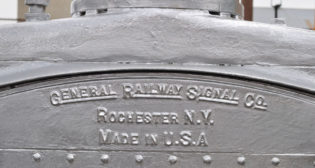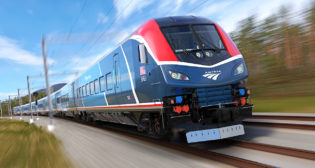
NJT: Goodbye, Ticket Punch. Hello, Scanner
Written by William C. Vantuono, Editor-in-ChiefThe manual ticket puncher has been a railroad conductor’s stock-in-trade tool for generations. On legacy systems like New Jersey Transit, which traces its roots to fallen flags like the Pennsylvania Railroad and Delaware, Lackawanna & Western, paper tickets are still in use, though they are fast being replaced with mobile phone apps. NJT has now begun a program to equip conductors with high-tech handheld mobile devices that scan and validate both paper and electronic tickets and passes.
NJT has begun issuing the mobile devices to train crews on the Raritan Valley Line (RVL). The devices “ultimately create a more contactless customer experience and improved ridership data,” NJT says.
The rollout of handheld mobile devices follows a previous pilot program that beta tested the concept and “provided real world feedback in the design and implementation process,” NJT says. “Deployment on the RVL will be conducted in stages over several weeks with small groups of crew members receiving and using the devices, followed by a brief analysis to ensure successful implementation until all crew members are outfitted. The program will be evaluated before moving to other commuter rail lines in the NJT system.
NJT says the transition will be transparent for customers, as they will not need to take any different actions. Upon displaying their ticket or pass, either paper or through NJT’s mobile app, the conductor will scan the barcode present on all levels of tickets, electronic or paper, rather than visually inspecting passes or punching paper tickets. Once scanned and validated, single-ride paper tickets will not be able to be reused As the deployment moves across the entire NJT system in the future, customers “eventually will not need to hand the crew member a paper ticket, creating a contactless experience.”
“By scanning all ticket types, NJT will have improved capability to collect and analyze data including fare collection and ridership trends,” the agency notes. Electronic scanning also combats against the use of fraudulent tickets. The handheld devices will support future applications including providing real time communication with conductors to enhance the flow of information to customers. Electronic scanning also provides future capability of enabling offline electronic ticketing, which would no longer require customers to have internet access to activate electronic tickets.”
“This is another way in which we continue to modernize NJ Transit to fully utilize all of the digital technology available today,” said President and CEO Kevin Corbett. “The data collected by scanning tickets and passes will provide us with faster insights into ridership trends and revenue streams, allowing us to more efficiently adjust service when needed. The mobile devices also have the ability for crew members to easily see information about potential service disruptions and improve onboard communications to customers.”
For traditionalists and long-time commuters, the sounds of metal ticket punchers, accompanied by the many tiny paper “chads” flying onto railcar floors and seats, not to mention the quaint seat checks that serve to remind conductors of which passengers they’ve already checked, will soon fade into history.



